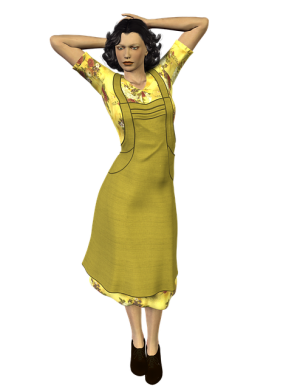1. apron ![]()
[noun]
[de/het schort, de schor-ten]
 An old-fashioned Dutch dinner consists of one simple course: beans or potatoes, meat and vegetables (see also Extra). Simple or not, there’s always the risk of spilling food on your clothes and making a bit of mess in the kitchen. That’s where an apron comes in handy, in Dutch a “schort“.
An old-fashioned Dutch dinner consists of one simple course: beans or potatoes, meat and vegetables (see also Extra). Simple or not, there’s always the risk of spilling food on your clothes and making a bit of mess in the kitchen. That’s where an apron comes in handy, in Dutch a “schort“.
The plural “schorten” is also a verb, see 2. below.
Examples:
– “Er zit een vlek op mijn schort.”
(“There’s a stain on my apron.”)
– “Mensenkinderen, wat een troep in de keuken!! Waar is mijn schort?”
(“My goodness, what a mess in the kitchen!! Where’s my apron?”)
Related words:
– Vlek : stain, spot, smudge [noun] [de vlek, de vlekken].
– Koken: 1. to boil [verb] [koken, kookte, h. gekookt]. 2. to cook [verb] [koken, kookte, h. gekookt].
Example:
– “Wel? Kan je nieuwe vriend een beetje koken?” – “Jazeker, Mark is echt geweldig!”
(“Well? Can your new boyfriend cook (a bit)?” – “Absolutely, Mark’s really great!”)
– Knoeien: to mess, to spill, to [verb] [knoeien, knoeide, h. geknoeid].
Extra:
The Dutch cuisine is not too ambitious and quite nutritious by intention. It is inspired by the Dutch fishing and farming history. Nowadays, Dutch cuisine has incorporated many foreign cuisines. For more info, check this article on Wikipedia.
2. to lack, to come short ![]()
[verb]
[schor-ten, schort-te, h. ge-schort]
In this context, “schorten” is usually combined with the preposition “aan”: “schorten aan”, which translates to “to come short of”, see the Examples.
Examples:
– “In deze wereld schort het aan mensen met een visie op de toekomst!”
(“This world lacks people with a vision on the future!”)
– “Het schort de mensen van het Rode Kruis aan medicatie, veel slachtoffers moeten hoesten en overgeven.”
(“The people of the Red Cross are coming short of medication, many victims have to cough and vomit.”)
Expressions:
–
“Wat schort eraan?”: what’s the matter? / What’s wrong?
– “Wat is er aan de hand?“: what’s the matter? / what’s going on?
Related words:
– Mankeren: to be wrong, to lack [verb] [mankeren, mankeerde, h. gemankeerd].
– Schaars: scarce [adjective].




